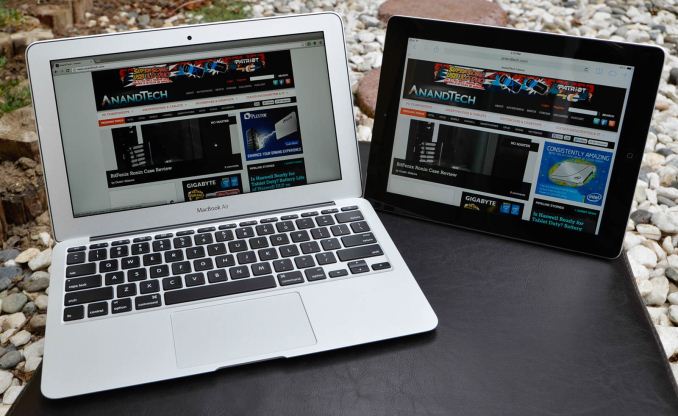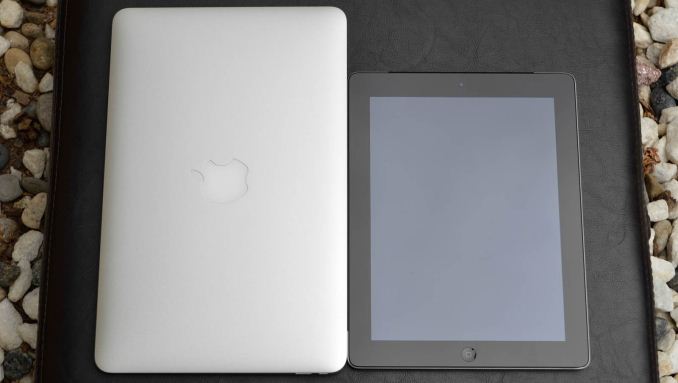The 2013 MacBook Air Review (11-inch)
by Vivek Gowri on August 9, 2013 1:45 AM ESTSince the last time the iPad versus MacBook Air 11” comparison was brought up, both products have improved and evolved tremendously, the iPad more so than the Air. It’s easy to dismiss even making the connection (because who here actually cross-shops a high-end ARM tablet with a mid-range ultraportable, raise of hands please) but I think there are enough shared attributes to make a discussion worthwhile, especially considering the similarity in terms of form factor and now battery life. If I was looking for an extremely compact, thin, light, and long-lasting companion device to bring on a trip, they’re both completely valid answers. But which would I actually take?
The short answer would almost always be the Air, for a variety of reasons, but I’ll get there. This basically goes back to the tablet versus notebook conversation for various usecases. The iPad is awesome as a travel device, as are most tablets in general, and you can see evidence of this in any airport terminal. Especially after the screen upgrade last year, the iPad is hands down one of the best content consumption devices on the market. It’s also my absolute favorite digital platform for reading. I’ll actually save lengthy articles, like some AnandTech reviews and other long-form content from other websites I enjoy, to read on my iPad. Between the sharpness of text on the Retina display and the physical closeness you have with the words, it’s about the closest you can get to a paper reading experience on an LCD. (This also holds true for any high-DPI tablet, including the Nexus 7.2, Nexus 10, Surface Pro, and others). Also, the ability to use a tablet with only one hand, not needing a platform of some kind, and general versatility of physical handling adds a convenience factor that’s hard to get from a notebook.
But when the tablet doesn’t have an inherent advantage in terms of size or battery life, it’s a lot harder to justify skipping the sheer versatility and power you get out of a real notebook computer, even a small one, for reasons that amount to the tablet being easier to use while standing up. The notebook is basically better at everything other than reading, and there’s far more computing horsepower at your disposal. You have far more control over everything that happens—media, browsing, documents, you name it. And there’s a real, physical keyboard, so in terms of productivity, there’s just not a conversation. To some degree, that’s always been something that held tablets back for me and I suspect the other editors on staff. Admittedly, our usecases typically involve a lot of writing and email, neither of which is easy at all without a hardware keyboard, so we’re probably not the right target demographic to judge tablets by.
The capabilities of a Core i5-based ultraportable are so far beyond that of an iPad or Nexus 10 though, which is part of what makes this on the surface a somewhat odd comparison to be making. Obviously the tablets are cheaper, though it’s worth pointing out that a 128GB iPad (WiFi) is only $200 less than a 128GB Air 11”, and as noted earlier the iPad keyboards typically run $100. I don’t know why anyone would need that much storage on an iPad, maybe if you had a ton of 1080p video content that you really needed to carry with you everywhere. The 16 and 32GB iPads, at $499 and 599, are obviously far more accessible and probably more sensible investments.
I’m not trying to recommend that people buy the Air over the iPad, just that it’s possible to do so with very little compromise. It wasn’t really something you could do until now simply because of battery life, but with Haswell ULT boasting similar or better power efficiency than high-end ARM SoCs in light everyday CPU-driven workloads, it’s certainly something to think about. I think the best of both worlds situation is yet to come, possibly with something that looks like a thinner, Haswell-based Surface Pro with Windows 8.1 and significantly better battery life than we’ve seen out of Ivy Bridge tablets in the last year.












139 Comments
View All Comments
jutre - Thursday, August 15, 2013 - link
Sorry name99, but I do not really mind your opinion, given your clear lack of judgment in posting comments. If you re-read carefully my post and the one from purerice, you will not find any complaint.jutre - Thursday, August 15, 2013 - link
I have not worked with a SSD-based computer so far. I am used to keeping multiple applications opened at the same time, because launching them takes to much time, so I really need 8Gb or RAM on my 2009 Imac. With an SSD-based laptop, maybe usage patterns change and you no longer need as many apps opened at the same time, so need less RAM ?HodakaRacer - Saturday, August 10, 2013 - link
Battery life and Performance with windows bootcamped? I know Anand tweeted about running windows on it..cindaydavilla - Saturday, August 10, 2013 - link
my buddy's step-aunt makes $61 every hour on the computer. She has been without work for 6 months but last month her pay was $14651 just working on the computer for a few hours. Here's the site to read more... www.max38.comccd2 - Saturday, August 10, 2013 - link
I disagree with you comment on the iPad versus MBA 11". After using the iPad for 6 months, I understand why you believe tablets are going to settle in at 7-8". That size tablet is easy to hold in one hand and, even more importantly, light enough to hold with one hand for extended periods of time. So why would I want the MBA which is even more awkward to handle??? It's even heavier, the keyboard does not fold fully around like the Yoga or detach. The MBA isn't better than an iPad because it can't be used the way most of us use a tablet.And as a PC? Why get the MBA when a larger PC like the 13" MBA is simply a better device?
Convergence devices like the 11" MBA have to make a decent compromise between tablet and PC to justify their often premium prices. I just don't see any device which has made a compelling argument for these devices. Some are getting close, like the Surface Pro or XPS12, but there is still more development to be done
FwFred - Saturday, August 10, 2013 - link
You hold a laptop (it's in the name "lap") far differently than a tablet. A 13" laptop is not awkward in the least. A 13" tablet is laborious to use. The point of the 11" is you bring your computer with you. When you get home, you can even dock it to a keyboard/mouse/monitor and use full fledged desktop software.I agree a 13" laptop is a better experience... unless you are very mobile and you always have your laptop stuffed in your bag.
ccd2 - Saturday, August 10, 2013 - link
You kind of support my point. Used as a laptop, in your lap, an 11" PC doesn't offer any real advantage over a 13" laptop. Stuffed in my bag, the weight difference doesn't matter much either. A 11" laptop needs to be some sort of convergence device for most of us, otherwise there are better options like a bigger laptop.Impulses - Saturday, August 10, 2013 - link
I've kind of given up on convergence devices for now... I enjoyed my Transformer, but I've moved on to a smaller Nexus 7. I was excited about Surface Pro, but it's just too much of a compromise for the price... Same for the 11" MBA. Even $500 Silvermount convertibles that finally break past the Atom performance envelope are unlikely to tempt me.I guess there's a reason the traditional laptop form factor has endured... I think some of the more interesting convergence devices are actually those that stick to one role without sacrifices and only offer extra versatility as a second choice... The Yoga 13 hinge design is rather appealing, I doubt I'd prop it up like an easel or whatever often but it takes nothing away from it's role as a laptop.
ccd2 - Saturday, August 10, 2013 - link
I agree. I'm looking at the new Nexus 7 as well. The problem with convergence devices is that they charge a premium for being a convergence, but just don't work that well. For the price of most of them, I can have a good 7" tablet and a larger PC with no compromises.name99 - Saturday, August 10, 2013 - link
The value of a large iPad is as a document reader. Not an eBook reader, but a technical document reader --- generally, but not limited to PDFs. This market appears to be large enough (individuals who most read tech documents, like myself, business use cases, and older people with bad eyes for whom the extra screen space is worth the other hassles) to sustain the 10" iPad indefinitely. Heck, if we assume the rumors to be true, there is enough of a demand for document readers that it makes sense for Apple to try a 13" iPad form factor.The basic point is that people use these devices in different ways. There is no way I would ever consider a 7" iPad -- it is useless for my specific needs. But obviously other people love it.
It is a waste of time from the point of view of market analysis to rely on anecdote ("I use this device in this way, and likewise all my [demographically identical] friends".)
Unless one has specific numbers regarding how people use devices, we have to rely on the common sense observation that if a company keeps making and selling a product, there is a substantial group of people who want it. Apple has been selling the 11" MBA for a while now. This seems to suggest that, in spite of your theoretical analysis, there IS a large enough group of people for whom this size is best that it remains a viable product.
I am sympathetic to your analysis. I have made a very similar analysis claiming that one of the reasons Surface Pro is not a viable product is because it fits uncomfortably between the cell phone (which everyone has and which serves mobile tasks well) and the laptop (which everyone has if they hope to do any sort of real work with Windows).
But at the end of the day, we have to calibrate these arguments to reality, especially if they're arguments from the gut without numbers to support them. I'd say reality supports my argument (Surface Pro is not and will not be viable) whereas it does not support your argument.
(It would be an interesting twist on your argument to consider why Apple can sell this form factor successfully whereas Windows cannot. Perhaps it is the very fit and finish of Apple --- a quality keyboard and trackpad --- along with OSX and its support for full-screen apps with maximum use of the display and easily controlled multiple virtual displays --- which makes the difference. A lousy keyboard and trackpad may be more painful in smaller form factor, and Windows full screen mode may still include enough chrome that each window is just that much less useful? In theory Windows8 Metro solves the chrome problem, but Metro has its own issues in that it does a terrible job of information density. Space isn't wasted in chrome, instead it's wasted everywhere.)